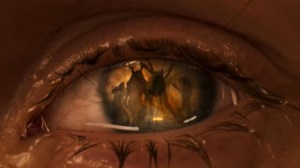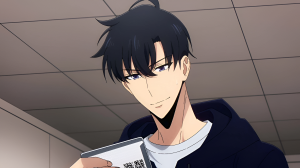Videos by ComicBook.com
Videos by ComicBook.com
As the series nears the half-way point in its first season, ComicBook.com had the chance to speak with Tropper about the process of developing a Bruce Lee classic and more. Here’s what he had to say about Warrior:

ComicBook.com: Warrior is something that’s been in development for five decades, 50-some years. How did you initially get involved with a project that’s been in development so long?
Jonathan Tropper: I was finishing up Banshee for Cinemax and I was doing my last piece. Then the guys at Cinemax know that I’m a huge Bruce Lee fan and they called me up one day and said, “We just met with Justin Lin and Shannon Lee and they’ve got this project that originated from Bruce Lee that they’re looking for a showrunner for.” So the next time I was in Los Angeles, I met with them and that’s how it all started.
As you just said, you’re a lifelong Bruce Lee fan. At any point in the development of this, did you feel there was an increased sense of pressure compared to when writing for Banshee or one of your previous projects?
Did I feel an increased sense of pressure? I mean there was pressure…it was definitely a bigger show. It was a period piece so there’s the pressure that comes from having to get all the research right and then beyond that it was like the fight scenes. Just sort of knowing that Bruce Lee’s name on it means that our fight scenes have to be the best on television or we’re going to be, not just letting people down, but we’re going to be selling the name of a martial arts legend and an icon.
You do bring up the fight scenes and through the first several episodes that I’ve seen, there are these beautifully crafted, intricate fight scenes. Each writer is different and has a different process of doing this, but could you take us into the development of these fight scenes? How do you write it? What goes between writing it and the screen?
Sure. Well, first of all, I was a martial artist for almost 20 years, but I’ve also been a martial arts movie buff for way longer than that and I write my fight scenes incredibly detailed. I write thinking that basically, every fight has to tell a story. Right? There are two characters in it or some amount of characters in it and for us, the fights always have to be an expression of character and extension of the story. So I write them very detailed. I write every punch and kick and spin and move. But then what happens is that the story goes to Brett Chan, our fight coordinator, and his team. They’ve been already told by me they don’t have to take me literally. I’m just conveying to them the tone of the fight and the story of the fight, but then they’ll take that and they’ll replace it with much better choreography that I’m writing.
So they kind of take the idea of the fight that comes from the narrative I’ve written, but then they really put in their own moves and expand it and elaborate on it and come up with a lot of stuff that I just wouldn’t have thought of.
Is there one throughout this first season that stands out to you? Do you have a favorite fight sequence?
No. I mean, I don’t really think of ’em like that, but I do think there’s something we do in our ninth episode that I think is…there’s a pretty long fight and I think it’s actually one of the best martial arts fight ever shot for television.
Andrew [Koji] does an awesome job in the lead role. How was the auditioning process like? Is Andrew well versed in the martial arts? Did you make Andrew go through potential stunts or anything of that nature?
No, actually we made that decision from the beginning. It was a very hard role to cast. We cast a very wide net. We went around the world looking for our Ah Sahm and one thing we decided early on was we didn’t want a Bruce Lee imitator. So we didn’t want somebody who moved like Bruce Lee or who looked like Bruce Lee because our feeling was that we were only going to get ourselves into trouble trying to do that because he’s got a once in a lifetime charisma, Bruce Lee, that manifests itself both in his character and in his physicality. If we try to imitate that, we would most likely fail. So instead, we wanted to just find a leading man who brings his own energy to the role and we would put some homages to Bruce Lee in that.
The other thing we decided was that it’s much more important for us to have an actor than to have a martial artist, so we wanted somebody who was going to have the ability to do the martial arts, but what we really needed was an actor. Andrew was one of the last auditions we saw. He sent in a tape from England. We were getting towards the end of our process and we really liked what we saw and then we flew him into LA.
When he was in his hotel room, I just asked him to use his iPhone and make a quick video of him just sort of getting into a Bruce Lee stance and making a few moves. He had done martial arts when he was younger, but he hadn’t in many years. He’d been much more focused on acting than action in the last bunch of years, but he does have stunt experience and he did have some martial arts training when he was younger and we could just see that. His body moved fluidly and he was very athletic, so we were confident that we’d have enough time to train him. And so we cast him knowing that his martial arts were rusty and not particularly advanced, but he threw himself into the train even more than we expected him to.
I mean he trained many hours every day. He transformed his body and he worked with some Wing Chun experts, he worked with Kung Fu experts, and then our stunt team really worked with him every day and by the time we were shooting, he just looked incredible.
Earlier you mentioned, of course, that this is a period piece where xenophobia is running rampant. Now, it’s 2019 and xenophobia is something that’s certainly back in the spotlight. Do topics and discussions like that impact how you write the show?
Yeah. 100 percent it does. When I wrote the pilot, we had a different president. I think we’re a bit different here. So there was still the story of immigration and racism to be told, but by the time we were getting into pre-production, our country had changed quite a bit and this stuff was much more in the forefront. As we did the rewrites, some of the rhetoric from today definitely found its way into our scripts.
You personally have a pretty good working relationship with Cinemax and Warrior is off to one hell of a start, especially critically. Has the team started talking about the future of the show or is anything in the works? Where’s the show go on from here?
Yeah, definitely. I mean yeah, we’re working on a second season which I hope will, everyone will get to see. We have plans for multiple seasons whether you never know with TV whether you’re going get them or not, but we certainly don’t go into this intending to do only one season.
*****
This interview was conducted prior to Warrior being renewed for a second season. Warrior airs Friday nights at 10/9 p.m. Central on Cinemax.
—–
Have you subscribed to ComicBook Nation, the official Podcast of ComicBook.com yet? Check it out by clicking here or listen below.
In this latest episode, we cover the hype around Avengers:Endgame, argue if Game Of Thrones is going to start going anywhere, and so much more! Make sure to subscribe now and never miss an episode!








